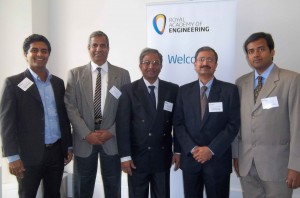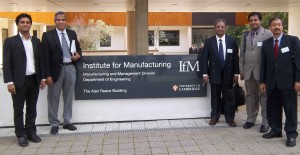26th June 2014 Mumbai, India
Prospects of UK-India collaborative partnerships in distributed manufacturing
Last week (16-19 June), I led a 4-member delegation of Indian manufacturing experts from the IITs and IISc to the UK for a 4-day programme on manufacturing. The visit kicked off with a one-day UK-India workshop on distributed manufacturing in London, jointly organised by the Royal Academy of Engineering and Indian National Academy of Engineering.
The engaging workshop, steered by experts and policy influencers from each country, witnessed active participation and dialogue among the attendees. There was a resounding consensus on the need to focus on manufacturing to secure the economic and social futures of the two countries. A plethora of forward looking issues were discussed such as mass customisation of products, Industry 4.0, collaboration between humans and robots, convergence of information technology and operations, value creation in a connected world, and highly flexible manufacturing, to name a few. The two academies agreed to collaboratively explore solutions to common challenges namely training and skills development, expanding academia-industry engagement, and identifying the barriers and drivers for distributed manufacturing. The intent to build the momentum of UK-India interactions was unanimous, and one of the delegates offered a practical suggestion to this end – starting a small mailing group comprising 10-15 manufacturing enthusiasts, who could post relevant updates to the group and catch up on a quarterly basis! I’ll post updates here once the mailing group has been formed.
 On the second day, the delegation visited the Institute for Manufacturing, based in the University of Cambridge. We were really impressed with the resources and facilities available at this Institute to pursue excellence in manufacturing. One of the labs we visited was a mini-replica of a manufacturing shop floor! We were told that students, during the course of the degree programme, could implement their ‘manufacturing’ projects in this laboratory. The undergraduate students are offered the option to enrol for the Manufacturing Engineering Tripos, wherein they spend the final two years of their engineering degree applying engineering knowledge in a business context. This fits well with the proposed future demand for workers having technical and business abilities, as laid out in the Foresight report on the future of manufacturing in the UK.
On the second day, the delegation visited the Institute for Manufacturing, based in the University of Cambridge. We were really impressed with the resources and facilities available at this Institute to pursue excellence in manufacturing. One of the labs we visited was a mini-replica of a manufacturing shop floor! We were told that students, during the course of the degree programme, could implement their ‘manufacturing’ projects in this laboratory. The undergraduate students are offered the option to enrol for the Manufacturing Engineering Tripos, wherein they spend the final two years of their engineering degree applying engineering knowledge in a business context. This fits well with the proposed future demand for workers having technical and business abilities, as laid out in the Foresight report on the future of manufacturing in the UK.
No trip to Cambridge is complete without visits to its prestigious colleges, which have produced the likes of Charles Darwin, Stephen Hawking or Jawaharlal Nehru (India’s first Prime Minister). Thanks to the bright evening hours, we embarked upon a guided walking tour of Cambridge, with pit stops at colleges including Trinity, Clare, and Corpus Christi. The guide also pointed us to a fledgling apple tree, apparently known to be the far descendant of the tree, which had helped Sir Isaac Newton discover gravity!
The third day of the visit took us to the Virtual Innovation Centre of Jaguar Land Rover in Gaydon, about 40 km south of Coventry in Warwickshire. At the Centre, we were shown a driving simulator, and a Virtual Reality Ergonomics laboratory, which helped optimise the external and internal features and therefore, design better cars. 
Next stop – the Manufacturing Technology Centre (MTC), Coventry. Earlier this year, I had met with the MTC’s Chief Executive, Dr. Clive Hickman. That technology accelerators such as the MTC could make a huge difference to the translation of discoveries from the laboratory to the market, became abundantly clear to the visiting delegation after the tour.
The final leg of the UK visit culminated with the BIS Manufacturing Summit, part of the ongoing International Festival for Business 2014 in Liverpool. The visiting Indian delegation received a special mention in the opening address at the summit, which had an impressive line up of speakers – Nick Clegg (Deputy Prime Minister), Michael Fallon (Minister of State for Business) and Vince Cable (Secretary of State for Business, Innovation and Skills). In his speech, Mr Clegg underscored the importance of manufacturing to the UK economy and touched upon other issues such as supply chain strategy and industrial policy. Earlier, Vince Cable announced a £7 million grant, through the aerospace industrial strategy, to the Advanced Manufacturing Research Centre at the University of Sheffield to support the development of next generation, environmentally friendly aircraft.
As we wrapped up the visit, a tremendous sense of enthusiasm and optimism prevailed among all the delegates with regard to the promising prospects of UK-India partnerships in distributed manufacturing. Stay tuned for updates on future engagements! Impressions from the visiting delegates:
“The MTC is an excellent effort by the UK government to bridge the gap between the academia and industry. Such a model could be emulated in India to expand and strengthen the academia-industry synergy.” Dr. N. Ramesh Babu, Indian Institute of Technology Madras
“This workshop provided an excellent forum to expose the scientists of both India and UK to some of the skill sets and technologies in the area of Distributed Manufacturing available to both the countries, as well as share ideas and information and identify what could be possible areas of bilateral cooperation.” Dr. Sankha Deb, Indian Institute of Technology Kharagpur
“I am immensely grateful to the UK Science & Innovation Network for inviting us to this trip and taking such good care. It was a great learning experience that will help us all in taking slightly bigger steps, together, than what we can achieve individually, and go a longer way toward evolving a sustainable manufacturing paradigm for the world.” Prof. B. Ravi, Indian Institute of Technology Bombay
“Interaction between industry and academia is very strong in the UK. The participation by thought leaders from industry and academia in the workshop reinforces it and I think there is also much to learn for me from the IfM and the MTC. On a personal note, the warmth with which we are always received in the UK is very gratifying.” Prof. B. Gurumoorthy, Indian Institute of Science